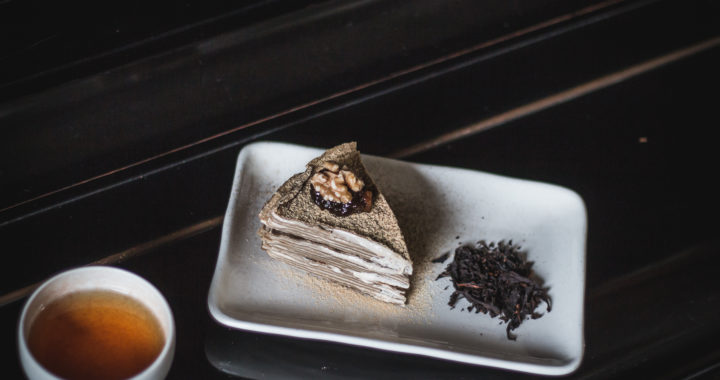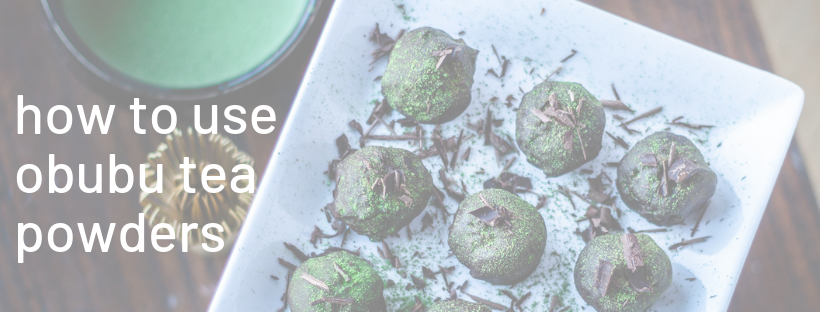Have you tried a Matcha ice cream, Matcha cookies or even a Matcha smoothie, yet? I bet you did! Matcha is going crazy all over the world in recent years. Not only because of the color of this famous tea powder, but also due to its many health benefits.
What, if we told you that you could use other teas – when ground to a powder – for making a delicious dessert, cake or whatever you fancy of try-tasting?
Besides our cooking grade Matcha powders, we have four very different tea powders that we would like to introduce you to in this article.
First things first, though. All our tea powders are made from our teas that we offer in our online shop, as well. That means, all tea powders are made from single origin teas produced here with us at Obubu in Wazuka. Similar to the production of our cooking grade Matchas, the tea powders are ground and then packed immediately to keep freshness.
If you like trying new recipes and are curious how different tea powders work well with sweet or savory food, give them a try. We have some inspirations for how to use our tea powders at the very end of this article.
Hojicha tea powder
Our Hojicha powder is made from our Basic Hojicha, a roasted green tea that had been roasted after steaming, rolling & drying the leaves at our Sencha factory. This very tea was harvested in June in between spring and summer harvest. It’s made from Bancha leaves from the lower parts of the tea plant. This Hojicha is very low in caffeine due to the roasting and because of the leaves that it was produced of.
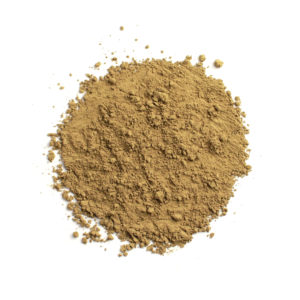
The Hojicha powder has a naturally sweet taste and a pleasantly woody aroma.
If you like Hojicha, this is the ideal match for pastries, ice cream, bread and even pasta!
If you’re up for an easy recipe, give this simple Hojicha Latte a try:
- 250 ml of milk / soy milk / oat milk
- 5g or more of Hojicha powder
- Honey & cinnamon to taste
Directions: Simmer milk and Hojicha powder (don’t overcook), add honey & cinnamon. Froth with a hand-frother until frothy.
Wakoucha tea powder
Did you know, that Japan also does Black Tea? In Japan Black Tea is called Wakoucha – Japanese Red tea, due to the color of the liquor.
In general, here in Japan all teas are produced from the Camellia sinensis sinensis variety that is perfect for producing green teas for what Japan is known for in the whole world. Since Japan is far away from the equator, all of the Japanese teas are naturally low in bitterness, but rich in its umami and sweet taste.
Black Tea on the other side is usually made from a variety called Camellia sinensis assamica, which grows in areas closer to the equator, such as India, and for that reason has more bitterness.
Japanese Black Teas however are made from Camellia sinensis sinensis and therefore are much sweeter and more delicate than its counterparts made of the assamica variety. Some batches can have honey or even caramelly notes to it, which makes them a perfect partner in crime for making sweets.
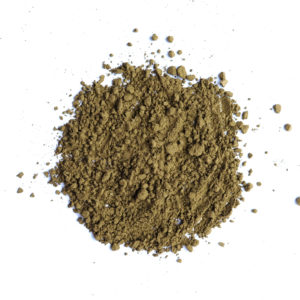
Our Wakoucha powder is made from the Yabukita cultivar that had been harvested in October.
After withering, rolling and drying it was ground to a powder that can be used for all of your baking & cooking experiments.
The tea powder has hints of dark chocolate and a pleasant honey-like aroma.
Genmaicha tea powder
This tea became popular not only in Japan, but across the globe due to its pleasant toasted aroma and its buttery sweet taste with hints of peanuts: Genmaicha.
It’s made from Bancha leaves harvested in June and Genmai, the toasted Mochi rice, usually in a 1:1 ratio.
Although the invention of this popular tea dates back to times, when tea wasn’t available in large amounts and producers would stretch it with rice to receive bigger batches, we still like to tell another story that was created around Genmaicha.
It is said that a Mochi maker dropped some of his Mochi on the floor and since he’s Japanese and very zen-minded also – meaning he didn’t want to waste food -, he’d pick up the Mochi to put it in some tea that he brewed before. Tadaa! Genmaich was invented. We love this story! ;-)
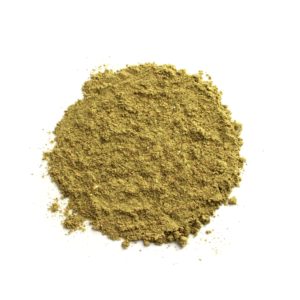
The powder of this famous tea is great for cooking and baking alike.
Try Genmaicha powder in a Smoothie or make some popsicles, dip it in white chocolate and sprinkle with Genmai.
Spoiler: We’ll be posting the recipe of these popsicles on our Instagram page in the near future!
Sencha tea powder
Sencha probably is the most famous and most traditional export of Japan, when it comes to tea. It is rich in antioxidants, vitamins and minerals. Since it’s an unshaded tea it is fully exposed to the sunlight during the shooting period giving the tea its typical grassy, but also slight astringent taste.
The Sencha that was used for making our tea powder is made from Yabukita cultivar and grew under the Japanese summer sun until it was harvested in July then sent to our Sencha factory for steaming, rolling and drying before being ground to our Sencha powder.
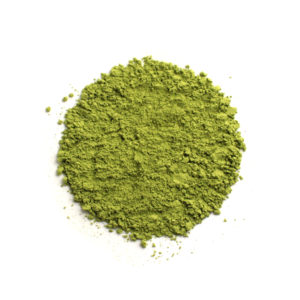
Use the Sencha powder for delicate pastries or desserts, like the one that’s provided in the recipes that we share below, using our Sweet Sakura Tea to balance out the astringency of the Sencha.
Clicking on the image below will lead you to our recipe selection for all four tea powders:
Hojicha, Wakoucha, Genmaicha and Sencha.
We would love to hear about your creations, sweet or savory!
Use this hashtag for Instagram to share your recipes with us: #obubuteapowders

